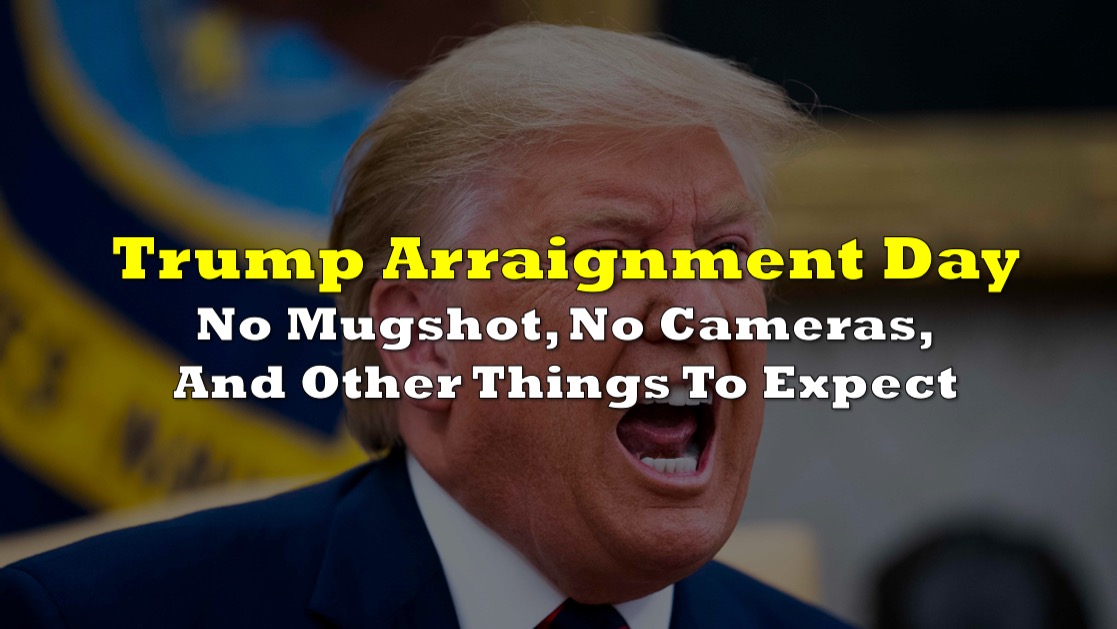Former President Donald Trump is scheduled to surrender to authorities in New York on Tuesday and face criminal charges for the first time, a historic first that has sparked rigorous security arrangements and planned protests by his followers.
A grand jury investigating a payment made on Trump’s behalf to an adult film star in 2016 in exchange for her silence about an alleged affair, which Trump has denied, handed down the accusations in an indictment. The particular charges are still under wraps.
Trump flew from Florida to New York on Monday and spent the night at Trump Tower in midtown Manhattan before his surrender and court appearance. He is the first former president to face criminal charges.
He is anticipated to surrender to police for processing at the Manhattan Criminal Courthouse, where he will be booked and detained. He will next appear before a judge for an arraignment hearing at 2:15 p.m. ET.
The indictment’s charges will be read aloud in court during Trump’s arraignment, after which the indictment will be unsealed.
The former president will subsequently be released and will return to Florida, where he has stated that he will deliver remarks Tuesday evening. He has denied all wrongdoing and has called Manhattan District Attorney Alvin Bragg’s probe a “witch hunt.”
BREAKING: Trump has lied about being forced to come to NYC for arrest and arraignment. He was offered the chance to be arraigned over Zoom from Mar-a-Lago and refused.
— Tristan Snell (@TristanSnell) April 3, 2023
He’s not a martyr. He’s a con man.
34 felonies, but no handcuffs and mug shot
According to a source, Trump will be arrested on Tuesday and charged with 34 felony counts of falsification of business records.
In New York, the offense of falsifying company records can be punished as a misdemeanor. According to the source, Bragg’s office upgraded all of the charges to Class E felonies — the lowest category of felony in New York state criminal code — on the basis that the action was designed to conceal another underlying crime.
A conviction for the Class E felony of fabricating company records in New York State can result in a four-year prison sentence. But, in practice, that appears highly unlikely.
The proof for the underlying crime that elevated Trump’s alleged misdemeanors to felonies remains unclear, and will not be until the indictment is unsealed on Tuesday. But, it is thought to be related to the payment of $130,000 in hush money to porn star Stormy Daniels during the final weeks of the 2016 election in order to conceal an extramarital affair with Trump.
Before Trump is escorted into a courtroom to be formally arraigned on the allegations, a New York City police arrest report outlining the charges against him will be prepared and placed into the court system.
Yet, according to the source, Trump will not be handcuffed, held in a detention cell, or photographed — all of which are standard processes even for white-collar defendants — until a judge has ruled on pretrial conditions. Bragg’s office, after checking with the Secret Service and New York City court officials, ruled that there was no need to handcuff or photograph the former president.
holy fucking shit, Donald Trump is being charged with 34 felonies. that's right, FELONIES. not misdemeanors. and by the way, that's 34 more felonies than the email lady is being charged with
— Jeff Tiedrich (@itsJeffTiedrich) April 4, 2023
No cameras in the courtroom
Judge Juan Merchan ruled on Monday night that videotaping of the proceedings would be prohibited. He determined that five photographers would be permitted into the courtroom before the arraignment to capture still images for “several minutes.”
Following that, “no further photography will be permitted in the courtroom,” as will electronic devices such as cell phones and laptop computers.
Nonetheless, in accordance with a long-standing New York state regulation, a group of credentialed reporters will be allowed inside. Cameras will be allowed in the courthouse corridors.
There will also be overflow rooms where spectators can view the proceedings remotely.
Judge Juan Merchan denies media coalition’s request for video coverage of tomorrow’s Trump arraignment; allows 5 pool cameras to shoot still photos until arraignment formally begins—and that’s it. pic.twitter.com/SrMN9yO3SZ
— Lisa Rubin (@lawofruby) April 4, 2023
Even if convicted, Trump can still be president
While allegations against a former president and top candidate for a major party’s presidential nomination are rare, nothing in the Constitution prohibits someone who has been charged or convicted from pursuing or holding office.
“It’s pretty widely accepted that the list of qualifications in the Constitution is exclusive — that is, Congress or states can’t add qualifications to those listed in the Constitution,” said Derek Muller, a law professor at the University of Iowa. “It’s something that really doesn’t affect your ability to run as a candidate, to appear on the ballot, or to even win the election.”
Candidates with criminal convictions have before run for president. There is even precedent for running for president while incarcerated.
Dan Ortiz, a law professor at the University of Virginia, cited Eugene Debs, who campaigned for president as the Socialist Party’s nominee in 1920 while imprisoned in a federal jail in Atlanta. Debs had been convicted of Espionage Act violations in connection with an anti-war speech. He received more than 3% of the national vote.
Between 1976 and 2004, Lyndon LaRouche, a fringe candidate who promoted conspiracy theories about an impending economic apocalypse, ran for president in every election. He was convicted of tax and mail fraud in 1988, but he continued to conduct his campaign from prison in 1992.
“If you’re convicted of a felony and incarcerated, you can’t vote, but you can win the election,” Muller said. “The point is, there were meant to be very few qualifications, and it was meant to be left to the voters or the state.”
Trump’s indictment appears to have provided him with a significant boost among Republican and Republican-leaning voters. In a Yahoo News/YouGov poll conducted March 30 and 31, Trump had a 26-point edge over Florida Gov. Ron DeSantis in a hypothetical matchup. Just two weeks ago, the same poll showed Trump with an eight-point advantage.
Post indictment polling: 2024 Republican primary (full field, 03/30-04/02)
— InteractivePolls (@IAPolls2022) April 3, 2023
Trafalgar:
• Trump — 56% (+33)
• DeSantis — 23%
Fabrizio:
• Trump — 51% (+30)
• DeSantis — 21%
YouGov:
• Trump — 52% (+31)
• DeSantis — 21%
McLaughlin
• Trump — 51% (+30)
• DeSantis — 21% pic.twitter.com/saVHFKnzGl
Headed for arraignment, dismissing another lawsuit
While the indictment proceedings are ongoing, Trump filed a motion asking the DC federal court to dismiss a civil suit filed by girlfriend of Capitol Officer Brian Sicknick, one of those who succumbed to injuries sustained in the infamous Jan. 6 Capitol attack.
“As much as President Trump expresses his condolences for the passing of Officer Sicknick, he is in no way liable for that sad event,” the motion to dismiss wrote.
In addition, Trump’s camp said plaintiff Sandra Garza–Sicknick’s girlfriend–“fails to allege that she is a person who may recover damages.”
The former president was sued by 12 Democratic lawmakers accusing him of sparking the attack. Other Capitol police officers have filed lawsuits against Trump for physical injuries and racist abuse sustained that day. Trump is attempting to get the cases dismissed through appeals; a federal judge in Washington rejected Trump’s position that he was immune from suit because he was a sitting president at the time.
NEW: Donald Trump files motion asking DC federal court to dismiss civil suit filed by girlfriend of Capitol Officer Brian Sicknick. Officer Sicknick died of multiple strokes after Jan 6 attack
— Scott MacFarlane (@MacFarlaneNews) April 3, 2023
(More) pic.twitter.com/qqNgJ9XhlL
Bracing for protests
New York City Mayor Eric Adams advised demonstrators to be nonviolent, notably mentioning Georgia Representative Marjorie Taylor Greene, who tweeted her intention to join protests on Tuesday.
“While there may be some rabble rousers thinking about coming to our city tomorrow, our message is clear and simple: Control yourselves. New York City is our home, not a playground for your misplaced anger,” Adams said. “Although while we have no specific threats, people like Marjorie Taylor Greene who is known to spread misinformation and hate speech… while you’re in town, be on your best behavior.”
Join us at City Hall for an important public safety update. https://t.co/3dNxm2ClWm
— Mayor Eric Adams (@NYCMayor) April 3, 2023
Starting at 10:30 a.m., Greene will lead a “Rally for Trump” organized by the New York Young Republican Club. Collect Pond Park is located near the courthouse.
Join me TOMORROW at 10:30 AM with @NYYRC to protest the political persecution of President Donald J. Trump in NYC at Collect Pond Park.
— Marjorie Taylor Greene 🇺🇸 (@mtgreenee) April 3, 2023
Wear your MAGA hats!!
RSVP to attend: https://t.co/R3wX5DRONl pic.twitter.com/XKva9eTzY0
Trump intends to spend Monday night in his Trump Tower residence before traveling to the courts, where he will be processed and freed rather quickly. He intends to return to Florida for a rally after the arraignment, although it is unclear whether he intends to make any public appearances in New York City before or after the arraignment.
Information for this briefing was found via the CBS News, Time, Yahoo, USA Today, and the sources mentioned. The author has no securities or affiliations related to the organizations discussed. Not a recommendation to buy or sell. Always do additional research and consult a professional before purchasing a security. The author holds no licenses.









